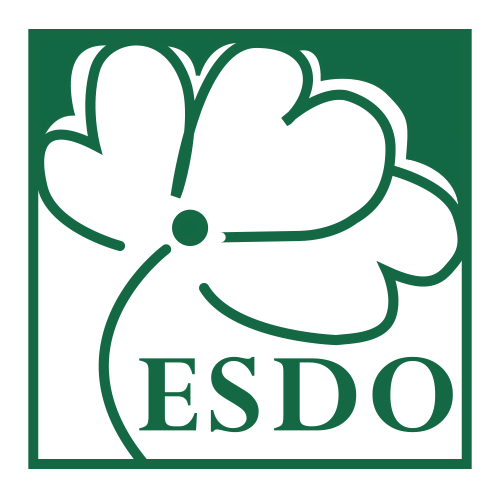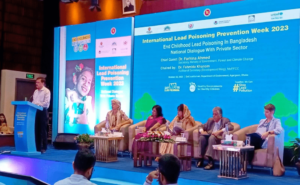A huge gathering of health and environmental experts, beauty experts and concerned stakeholders urged the ban of microplastic, especially microbeads in an inception workshop under the theme of “Combating the pollution threat from microplastic litter to save marine health in the Bay of Bengal” to make people aware about the emerging pollution threat from microplastic. The event was organized by Environment and Social development Organization-ESDO at Four Seasons Restaurant, Dhanmondi, Dhaka.
The session was chaired by Syed Marghub Murshed, Former Secretary, People’s Republic of Bangladesh and Chairperson of ESDO. The guest of honor was Md. Ziaul Haque, Director (AQM), Department of Environment (DoE) and the panelists were Mahmood Hasan Khan, Former Director, DoE; Dr. Abu Jafar Mahmood, Rtd. Professor, Dept. of Chemistry, University of Dhaka; and Dr. Md. Abul Hashem, Dept. of Chemistry, Jahangirnagar University.
Plastic pollution is a global concern whereas microbeads used in personal care products are one of the largest contributors to this plastic trash. In Bangladesh, microplastics pollution is a new phenomenon and manufacturers and consumers are not aware of the negative impact of microplastic and the microbeads. ESDO is going to kick off the project with an aim to reduce or eliminate use of microplastics in Bangladesh.
According to the study findings of ESDO, three major cities of Bangladesh, Dhaka, Chittagong and Sylhet city dwellers release a huge quantity of microbeads every month. 6628.46 billions of microbeads from Dhaka, 1087.18 billion of microbeads from Chittagong and 212.38 billion of microbeads from Sylhet city are dumped in to the water bodies and wetland. The huge microbeads content will highly cost the environment and human health by causing heart disease, type-2 diabetes, cancer, obesity in human body, small tears in skin leaving it vulnerable to bacteria and by accumulating toxic contaminants – persistent organic pollutants.
Experts in the meeting said, Mirobeads are plastic particles less than 1 mm in size that can be spherical or irregular in shape and produced in a multitude of colors. The types of plastic most commonly used as microbeads are: polyethylene (PE), polymethyl methacrylate (PMMA), nylon, polyethylene terephthalate (PET) and polypropylene (PP).Sewage treatment plants are not equipped to remove particles that are
small. Fish can confuse them as eggs or zooplankton and accidentally ingest them, which ultimately end up in human bodies. Microbeads being small in size have a large surface area by volume. As a result, they accumulate toxic contaminants. Consumption of these toxic chemicals may cause liver toxicity and disrupt the endocrine system. Microbeads in beauty products and toothpaste can be harmful to skin and teeth accordingly.
In response to question from a journalist, Syed Murshed said, there is no evidence of microbead’s usefulness, rather it is a serious health and environment polluting agent. He said that we need to address this issue with high priority to protect our ecosystem, wildlife and human health.
Md. Ziaul Haque said, globally anti-plastic campaign has started in a wide magnitude whreas Bangladesh has not made such progress so far. It is high time to sort out the microplastic added products and to move forward with the solution thereby.
Secretary General of ESDO and ecosystem expert Dr. Shahriar Hossain informed that the marine species are unable to distinguish between food and microplastics and therefore indiscriminately feed on microbeads. These sea foods are regularly consumed by humans. This is the way microbeads will start accumulating in the food chain, transferring from species to species, with consequences ultimately to humans. Dr. Shahriar said, toxic chemicals added to plastic during the manufacturing process (such as plasticizers and flame retardants) leach out of plastic in the small to large water bodies, wetlands and the marine environment and poses serious threats to marine fauna.
Amongst other, Siddika Sultana, Executive Director, ESDO, were there to share her opinion about the importance of the regulation to limit the content of microbeads in our daily personal care products. The ESDO team of experts said, the horrifying truth is that we don’t know how much of this plastic junk is despoiling our rivers, wetlands and the sea and no one know the toll it is taking of wildlife and people. Tiny plastic beads in everything from personal care and cleaning products to toothpaste are poisoning our river and sea to oceans and threatening health. It’s time for them to be outlawed.
ESDO urge the government of Bangladesh and the people to come forward and raise the voice to “ban microbeads”. They stressed for mass public awareness, immediate ban of microbeads containing products, stop production, sale and import of microbeads containing products and legislation to ban the use of microplastic and microbeads in Bangladesh.


